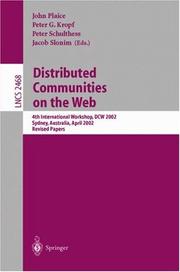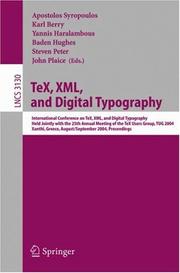| Listing 1 - 3 of 3 |
Sort by
|
Book
ISSN: 03029743 ISBN: 9783540676478 3540676473 3540451110 Year: 2000 Volume: 1830 Publisher: Berlin, Heidelberg : Springer Berlin Heidelberg : Imprint: Springer,
Abstract | Keywords | Export | Availability | Bookmark
 Loading...
Loading...Choose an application
- Reference Manager
- EndNote
- RefWorks (Direct export to RefWorks)
Communities are groupings of distributed objects that are capable of com- nicating, directly or indirectly, through the medium of a shared context. To support communities on a wide scale will require developments at all levels of computing, from low-level communication protocols supporting transparent - cess to mobile objects, through to distributed operating systems, through to high-level programming models allowing complex interaction between objects. This workshop brought together researchers interested in the technical issues of supporting communities. This workshop was the third in the DCW series. The ?rst two, entitled D- tributed Computing on the Web, took place in 1998 and 1999 at the University of Rostock, with proceedings published by the University of Rostock Press. This year, the workshop also incorporated the ISLIP (International Symposium on Languages for Intensional Programming) symposium. The ISLIP symposia have taken place every year since 1988, and have led to two volumes published by World-Scienti?c (Intensional Programming I, 1995, and Intensional Progr- ming II, 2000). While the two conferences emerged from di?erent needs, their focus merged to such an extent that it became clear that a joint conference promised to o?er great opportunities.
Electronic data processing --- World Wide Web --- Traitement réparti --- Web --- Distributed processing --- Congresses. --- Congrès --- 681.3*C2 --- Computer communication networks: data communications; OSI; security and protection --- Computer Science --- Engineering & Applied Sciences --- 681.3 *C2 Computer communication networks: data communications; OSI; security and protection --- Computer science. --- Information technology. --- Business --- Computer communication systems. --- Artificial intelligence. --- Computers and civilization. --- Computer Science. --- Computer Communication Networks. --- Popular Computer Science. --- Information Systems Applications (incl. Internet). --- Artificial Intelligence (incl. Robotics). --- IT in Business. --- Computers and Society. --- Data processing. --- Civilization and computers --- Civilization --- AI (Artificial intelligence) --- Artificial thinking --- Electronic brains --- Intellectronics --- Intelligence, Artificial --- Intelligent machines --- Machine intelligence --- Thinking, Artificial --- Bionics --- Cognitive science --- Digital computer simulation --- Logic machines --- Machine theory --- Self-organizing systems --- Simulation methods --- Fifth generation computers --- Neural computers --- Communication systems, Computer --- Computer communication systems --- Data networks, Computer --- ECNs (Electronic communication networks) --- Electronic communication networks --- Networks, Computer --- Teleprocessing networks --- Data transmission systems --- Digital communications --- Electronic systems --- Information networks --- Telecommunication --- Cyberinfrastructure --- Network computers --- IT (Information technology) --- Technology --- Telematics --- Information superhighway --- Knowledge management --- Informatics --- Science --- 681.3 *C2 --- Artificial Intelligence. --- Application software. --- Business—Data processing. --- Application computer programs --- Application computer software --- Applications software --- Apps (Computer software) --- Computer software --- Electronic data processing - Distributed processing - Congresses --- World Wide Web - Congresses

ISBN: 3540362614 3540003010 Year: 2002 Publisher: Berlin, Heidelberg : Springer Berlin Heidelberg : Imprint: Springer,
Abstract | Keywords | Export | Availability | Bookmark
 Loading...
Loading...Choose an application
- Reference Manager
- EndNote
- RefWorks (Direct export to RefWorks)
Electronic data processing --- World Wide Web --- Computer Science --- Engineering & Applied Sciences --- Distributed processing --- Computer science. --- Computer communication systems. --- Computer programming. --- Software engineering. --- Operating systems (Computers). --- Database management. --- Computer Science. --- Computer Communication Networks. --- Popular Computer Science. --- Database Management. --- Programming Techniques. --- Software Engineering. --- Operating Systems. --- Computer operating systems --- Computers --- Disk operating systems --- Systems software --- Computer software engineering --- Engineering --- Informatics --- Science --- Data base management --- Data services (Database management) --- Database management services --- DBMS (Computer science) --- Generalized data management systems --- Services, Database management --- Systems, Database management --- Systems, Generalized database management --- Operating systems --- Electronic computer programming --- Electronic digital computers --- Programming (Electronic computers) --- Coding theory --- Communication systems, Computer --- Computer communication systems --- Data networks, Computer --- ECNs (Electronic communication networks) --- Electronic communication networks --- Networks, Computer --- Teleprocessing networks --- Data transmission systems --- Digital communications --- Electronic systems --- Information networks --- Telecommunication --- Cyberinfrastructure --- Network computers --- Programming


ISBN: 3540277730 3540228012 Year: 2004 Publisher: Berlin, Heidelberg : Springer Berlin Heidelberg : Imprint: Springer,
Abstract | Keywords | Export | Availability | Bookmark
 Loading...
Loading...Choose an application
- Reference Manager
- EndNote
- RefWorks (Direct export to RefWorks)
This volume contains the papers that were accepted for presentation at the International Conference on T X,XML, and Digital Typography, jointly held with E the 25th Annual Meeting of the T X Users Group in Xanthi, Greece in the sum- E mer of 2004. The term “Digital Typography” refers to the preparation of printed matter using only electronic computers and electronic printing devices, such as laser-jet printers. The document preparation process involves mainly the use of a digital typesetting system as well as data representation technologies. TXand E its offspring are beyond doubt the most successful current digital typesetters, while XML is the standard for text-based data representation for both business and scientific activities. All papers appearing in this volume were fully refereed by the members of the program committee. The papers were carefully selected to reflect the research work that is being done in the field of digital typography using T X and/or its E o?spring. The problems for which comprehensive solutions have been proposed include proper multilingual document preparation and XML document processing and generation. The proposed solutions deal not simply with typesetting issues, but also related issues in document preparation, such as the manipulation of complex bibliographic databases, and automatic conversion of text expressed in one grammatical system to a more recent one (as for the Greek language,converting between monotonic Greek and polytonic Greek). The conference is being graciously hosted by the Democritus University of Thrace in Xanthi and by the Greek T X Friends. We wish to thank Basil K.
Computer science. --- Text processing (Computer science. --- Computer Science. --- Document Preparation and Text Processing. --- Computerized typesetting --- XML (Document markup language) --- Type and type-founding --- Book Studies & Arts --- Education --- Social Sciences --- Digital techniques --- Digital techniques. --- TeX (Computer file) --- Digital type and type-founding --- Automated typesetting --- Computer typesetting --- Typesetting --- Computer programs --- Data processing --- Tau epsilon chi --- TeX (Computer system) --- Text processing (Computer science). --- Digital electronics --- Word processing --- Natural language processing (Computer science). --- Natural Language Processing (NLP). --- NLP (Computer science) --- Artificial intelligence --- Electronic data processing --- Human-computer interaction --- Semantic computing
| Listing 1 - 3 of 3 |
Sort by
|

 Search
Search Feedback
Feedback About UniCat
About UniCat  Help
Help News
News